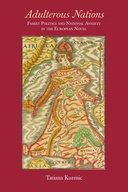Explore
Adulterous Nations : Family Politics and National Anxiety in the European Novel
Tatiana Kuzmic
2016
0 Ungluers have
Faved this Work
Login to Fave
In Adulterous Nations, Tatiana Kuzmic enlarges our perspective on the nineteenth-century novel of adultery and how it often served as a metaphor for relationships between the imperial and the colonized. In the context of the long-standing practice of gendering nations as female, the novels discussed—Eliot’s Middlemarch, Fontane’s Effi Briest, and Tolstoy’s Anna Karenina, along with Šenoa’s The Goldsmith’s Gold and Sienkiewicz’s Quo Vadis—can be understood as depicting international crises on the scale of the nuclear family. Kuzmic argues that the hopes, anxieties, and interests of European nations in this period can be discerned in the destabilizing force of adultery. Reading the work of Šenoa and Sienkiewicz, Kuzmic illuminates the relationship between the literature of dominant nations and that of the semicolonized territories that posed a threat to them. Kuzmic’s study enhances our understanding of not only these novels but nineteenth-century European literature more generally.
This book is included in DOAB.
Why read this book? Have your say.
You must be logged in to comment.
Rights Information
Are you the author or publisher of this work? If so, you can claim it as yours by registering as an Unglue.it rights holder.Downloads
This work has been downloaded 463 times via unglue.it ebook links.
- 130 - pdf (CC BY-NC-ND) at OAPEN Library.
- 165 - pdf (CC BY-NC-ND) at Unglue.it.
Keywords
- Adultery
- George Eliot
- KUnlatched
- Leo Tolstoy
- Literary Criticism
- Literary Criticism / Modern
- Literary Criticism / Modern / 19th Century
- Literature
- Middlemarch
- Poland
- Russia
Links
DOI: 10.26530/oapen_628775Editions


